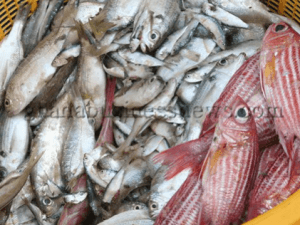Ghana government receives $53.8m to improve fishing industry
 Government has received an amount of $53.8 million to improve and ensure the sustainable management of the country’s fish and aquatic resources.
Government has received an amount of $53.8 million to improve and ensure the sustainable management of the country’s fish and aquatic resources.
The International Development Association (IDA) is financing $50.3 million, while the Global Environment Facility will finance $3.5 million under the West Africa Region Fisheries Programme.
The project is meant to strengthen the country’s capacity to sustainably govern and manage the fisheries, reduce illegal fishing and increase the value and profitability generated by fish and aquatic resource exploitation.
The beneficiaries for the programme include an estimated 206,000 marine and Lake Volta fishers, at least 27,000 women fish processors and over 3,000 fish farmers.
Mr Godfrey Baidoo-Tsibu, head of the Monitoring, Control and Surveillance Division of the Fisheries Commission said this on Thursday in Accra in an interview with the Ghana News Agency after a panel discussion on the Ghana Journalists Association programme dubbed: “Business Advocate” on Ghana Television.
The programme which comes on weekly, is being supported by BUSAC Fund, Denmark Embassy and the United States Agency for International Development.
Speaking about the decline of the fishing industry in the country, he said the problem was necessitated by the open access people have to fishing, leading to exploitation and illegal activities.
Mr Baidoo-Tsibu said the Commission was mandated to regulate the Fishery Act 625, 2002 and had made strides in enforcing the fisheries laws and regulations, including beach combing, Sea and Volta Lake patrol operations.
He said government had gathered and analyzed intelligence data on fisheries operations, import and export, as well as post observers and inspectors on industrial vessels to ensure compliance with the Fisheries law.
Mr Baidoo-Tsubi called for effective public education on illegal fishing, stressing that the Gulf of Guinea had been identified as an endemic illegal, unreported and unregulated fishing area threatening the country’s tuna industry.
Mr Kwadwo Kyei Yamoah, Programmes Manager of Friends of the Nation, an socio-environmental advocacy NGO said the decline of the fishing industry stemmed from the fact that fishermen were chasing after little fish using unsustainable and illegal fishing methods.
He mentioned some of the methods as the use of light and dynamite for fishing which deteriorated the fish resources, without recourse to its sustainability.
He urged government to be proactive and enforce the laws governing the fishing industry as well arrest and prosecute perpetrators to serve as a deterrent to potential offenders.
Mr Kofi Agbogah, Director of Hen Mpoano, an NGO that focuses on reducing poverty and hunger by improving fisheries and aquaculture, said there was the need to empower marine police to fight illegal fishing along the coast.
He said his organisation was striving to achieve large scale, environmentally sustainable fishing and ensure access to fish at affordable prices for poor consumers in developing countries.
He called for effective dialogue for the growth of that sector since the survival of the fisheries industry was critical to the nutritional needs of Ghanaians.
Source: GNA
